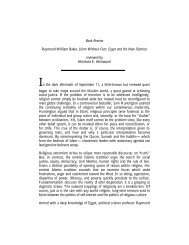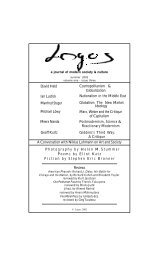Michael J. Thompson Stephen Eric Bronner Wadood Hamad - Logos
Michael J. Thompson Stephen Eric Bronner Wadood Hamad - Logos
Michael J. Thompson Stephen Eric Bronner Wadood Hamad - Logos
Create successful ePaper yourself
Turn your PDF publications into a flip-book with our unique Google optimized e-Paper software.
Jason Schulman<br />
unionism,” Gompers style, supposedly represented “true” trade unionism<br />
uncorrupted by middle-class socialist intellectuals who cared nothing for<br />
“meliorating the immediate conditions of the workers.” The historic<br />
opposition of Gompers’s American Federation of Labor to the inclusion of<br />
women, blacks, Mexican Americans, Chinese Americans, or most unskilled<br />
laborers in the labor movement is ignored, as is the autocratic nature of the<br />
unionism that he consolidated. Meany is praised for being an enthusiastic<br />
Cold Warrior who purged Communists from American unions and<br />
“rid[ding] the movement of racial discrimination.” The truth is that Meany<br />
opposed the historic March on Washington in 1963, and whatever efforts he<br />
did put toward anti-racist measures—such as lobbying for the 1965 Civil<br />
Rights Bill—were done in order to stave off criticisms for having done little<br />
in the past; he was far more interested in fighting Communists (and left<br />
critics) than fighting racists. Muravchik, of course, identifies with Meany’s<br />
support of the Vietnam War and his animosity toward the peace movement<br />
(Meany once denounced peaceniks as “fags”). He glosses over the merger of<br />
the foreign operations of the AFL-CIO with the counterintelligence sections<br />
of the CIA and their reactionary consequences both in Latin America and at<br />
home. He repeats the falsehood that Meany molded the labor movement<br />
“into a mighty force in American life.”<br />
The truth is that, as Paul Buhle writes, labor’s support for U.S. imperialism<br />
“paid virtually all of its [job-creating] benefits in the short run, and to a<br />
relatively select proportion of working people. Rather than reproducing<br />
union loyalty, the defense-linked rise of Sun Belt industry created large<br />
pockets of white working class conservatism, just as big-ticket construction of<br />
suburbs reinforced racial boundaries and in several different ways greatly<br />
diminished prospects of union democracy. The environmental recklessness of<br />
everything-for-production, taken with hypocritical race policies and a<br />
staggering indifference to the expanding clerical (especially female) sectors of<br />
the workforce, made the labor movement increasingly unpalatable and<br />
unsuccessful as time went on.” 6 The weakness of the U.S. labor movement<br />
today is the legacy of Cold War business unionism. To this, Muravchik is<br />
indifferent; it is, after all, working class conservatism that he supports, or<br />
more precisely working class support for the “American counter-model” to<br />
socialism. As the Stalinists of yesteryear saw the USSR or China as the<br />
Vanguard Country, so Muravchik sees America as the Vanguard, the envy of<br />
the world. No, America has “not always been loved,” but its imperialism is<br />
only “supposed.” Given how many people around the world currently see the<br />
<strong>Logos</strong> 2.3 – Summer 2003




